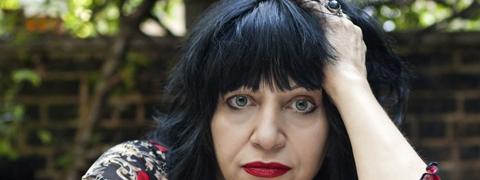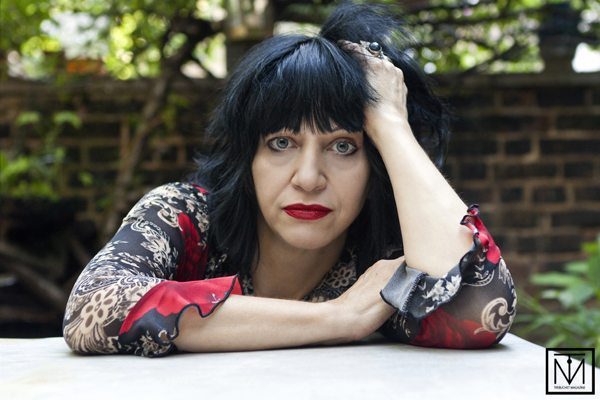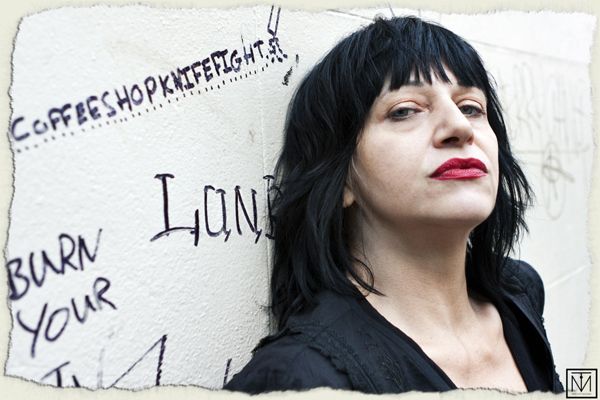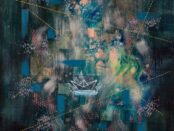[dropcap style=”font-size:100px; color:#992211;”]”Y[/dropcap]ou have to clean me up if you want to put me in front of a camera”
Lydia Lunch is adjusting her fringe, dappled under the late summer vines of a Fulham boozer. Trebuchet’s photographer hovers around as we get down to ‘Lydia Lunch’: the raunchy, political, and utterly profane heroine of dark music.
“Usually I ask you to clean it up after the fact. I’m not afraid of getting messy, I’m often a mess. I get sloppy, somebody’s got to be the anti-Katy Perry”
Expectation is a weird thing for journalists. It’s mostly bullshit and, unless moderated, kills music, films, books and your own writing dead. But it’s the optimistic juice that gets you out the door with a hard pencil in your hand.
Lydia Lunch first rang loud at the forefront of the late 70s New York No Wave scene, alongside Sonic Youth and the musical careers of many that would record within the larger (and less geographically defined) post-punk oeuvre, and well into what has so far been a pretty depressing millennium. The 80s saw Lunch cutting the fuck out of culture with a prolific (if erratic) canon of poetry, writing, spoken word and music.
The results of which she’d reap in the 90s. The blistering garage DNA of Teenage Jesus and The Jerks would go on to imbue the attitude of every punkish female singer from PJ Harvey to Bikini Kill to Transvision Vamp, though never with quite the same macabre originality or street rage. Lydia Lunch is as raw, cool and authentic as anyone you’ve read about – just don’t call her an icon.
“A Feminist Icon? Can you define it? I don’t like the word icon.
I’d do ‘Con’. I con.
Con-artist. I have respect for that. It’s not as if I’m promoting a dogma or a philosophy, I’m just trying to express my agitation at that which pisses me off. In a poetic way. I’m not preaching a dogma. There’s not a manual, there’s not a course. Although, I do hold workshops (Post Catastrophe Collaborative Workshop: Artist’s Workshop By And For Women).
It’s just not a title that I find appropriate.
I don’t live with it. You don’t walk into my house and there’s a sign saying ‘feminist icon’. ‘Hail to the Queen’ it might say though! It’s like genres. There’s a different genre every time I make something. That’s why I like ‘no wave’: it says nothing. It’s very Dada. I consider my self Dada.
Maybe a Dada icon.”
Despite the obvious draw (free thinking sexualised female musician with killer bangs), to her endless credit she never became an MTV pundit or gen-x talking head – perhaps because she swings against the polls with every ‘you’re not with me’ haymaker.
“I’m a humanist. I speak for the general human condition and focus on what agitates me about the cockocracy. Mind you, that may change at any time, as I’m as agitated by a lot of female behaviour as well. However since [the female perspective isn’t] running any corporations, we’re under the umbrella of being victimised by the fucking cockocracy and that ain’t gonna change. So under that we carve our private niche, our personal utopias – which is important.”
In conversation Lunch dramatically subverts her own statements, savages you (the male journalist) as the hated world, before joining you in laughing at the premise like a worthy conspirator.
[quote]There’s so much
death in my family
from contamination[/quote]
It’s rare for famous people to be self aware enough to recognise they aren’t interesting as soup cans, that they have to be a person. Ideally a person still making an effort matched by catchy declaratives.
In 2013 Lydia Lunch is public news again, a new generation is going back to those early records, digging deep for authenticity and new hooks to mine. Asking Lydia about her unique guitar playing (that become synonymous with the art noise of No Wave) she shrugs:
“It’s interesting because when I was asked to play the Teenage Jesus Resuscitation (led by Thurston Moore) I said “well, if you’re in it I’ll do it”. Only because he knew that Teenage Jesus was commanded into such a precision operation under the threat of a coat hanger on the back of the thighs. With that in mind he agreed.
You hit them with coat hangers?
“Yes. They had to learn somehow. Jesus.
When Teenage Jesus returned I could remember all the slide parts completely, as though it were yesterday, but I couldn’t locate where the rhythm parts were so I had to call Sclavunos. As the reunion was Sclavunos and Thurston Moore (or the Twin Towers, as I like to say, with me being building seven (me with two 6 foot 7 guys)).
[quote]I do feel that it is
a calling, to be a
mouthpiece for some
individuals that just
feel they’re screaming
and no sound is
coming out[/quote]
So I was asking about where all these exotic chords were etcetera, and he knew the keys because he remembers everything, and he said: ‘well, you didn’t have a guitar at the time, you always borrowed a Fender and a Fender twin reverb. Once a month someone would tune the guitar’. So a lot of the live recordings were made somewhere along that time. So it wasn’t so much that I had weird tunings, but that I had whatever tunings I had.
So it became difficult to figure out the strange harmonics. Both Nels Cline and James Johnston (amazing guitar players) found it really tricky to learn how to play the songs because at the time I had no knowledge of how to write music. Finally I decoded it (thirty years later). It’s a specific down-stroke on certain parts that make it unique and difficult for ‘musicians’ to comprehend. So I had to tell Nels Cline that he sucked at playing ‘Orphans’. I said ‘Dude you just don’t have it’!
Now Weasel (Walter) can do Teenage Jesus backwards because he’s studied it. Weasel is an expert. He’s been studying me for about three decades, we share a lot of the same philosophies – we’re happy haters.
We hate but we’re happy! I’m pretty happy day to day, but we fucking hate. He’s extremely prolific and he doesn’t give a shit about a lot of the same things I don’t give a shit about. He just gets it. He understands exactly what I mean. I don’t have to explain and he’s a fucking genius, so why settle for anything less? I call it a bromance.”
Recently, in a characteristic swerve, Lunch published a cookbook. Asked how ‘punk’ that might appear, she bristles:
“I’m not punk and I never was. I was more Dada. I started doing political speeches in 1982 against Reagan, against the war, against prison. And the environment is something that we can’t fucking avoid. It’s a problem. I don’t really see enough violently articulate mouthpieces against it. So I see wrongs, I talk about them, and I don’t care what fucking shape that takes.
My main themes are the victimisation of the individual, and we are being victimised at every fucking step of the day – period. So it’s only natural that I’m going to talk about that. I could give a shit less about your fashions or genres.
Punk: a fashion statement with bad music, I never was.
Where I grew up was next to a superfund site. A superfund site means ‘so fucking toxic that no one should live there’ and [if so] they’ll close it down. It was fifty miles from where I grew up and there was a lot of residue from that. Greenpoint is the last designated superfund site, which is by the Newtown Creek. It has more underground oil spillage than the Exxon Valdez and it’s a mile away from where all of us lived.
The creek is fifteen feet of black mayonnaise. Do I need to say more about contamination zones? It’s why I wrote a cookbook. I mean we eat all the time. Even growing your own is not so safe, but at least have some consciousness. It’s important.
There’s so much death in my family from contamination. I just had two cousins die of brain cancer at 62 last year. Eastman-Kodak, Xerox, Bethlehem steel, the Manhattan project: all that debris is dumped there. The Love Canal is the first superfund site and the reason it was busted was because a couple of journalists in 1976 wondered why 56% of the births had birth defects?
This the environment we live in. Then in 1997 I moved to New Orleans, which is even more toxic. Then Richmond, etc, etc. I’ve been to hell. Now I just have to get back to a farm or something. You just hope that one cancer eats the others. That’s the price you pay for being alive – death. That’s why I work at the rate at which I do. I don’t expect more ‘more’. I’m extremely healthy despite my vices: never sleeping, doing drugs, smoking cigarettes etc.
Balance, balance, balance. A kale shake on the weekend, goddamn, it balances it all out.
The target for Lunch’s writing and spoken word deals with the outsider realities of the American experience. Her underpinning message of ‘let’s stop pretending identity isn’t serious’ is drawn out with hard facts: gun control, school shootings, and a particular type of American psychosis. Lydia, whose favourite gun is a 357, is a great shot and is clear on why a gun is her response to America.
[quote]I feel that as a
human being you
have a right to feel
safe at night and if
that means having
a 357 cocked and
loaded on the night
table, so be it[/quote]
“When I moved to New Orleans in 1997 from New York they still had the John Wayne law in existence, which meant that you could walk around with a gun in a holster. If it wasn’t hidden.
I got gun training in New Orleans because seventeen policemen were arrested the year I got there and I didn’t want to be a victim of one of them. When seventeen cops are on the take, killing people and getting arrested, you need to protect yourself. Remember that it was the murder capital of America in those days.
I moved there knowing no one, I was living in an abandoned historical house. I took gun training because I think a woman needs to feel safe in her own home – that’s America. I don’t really think that pertains to the entire fucking planet (maybe) but I feel that as a human being you have a right to feel safe at night and if that means having a 357 cocked and loaded on the night table, so be it.
Just know what you’re fucking doing.”
“It is not rhetorical, it’s factual. Because I’m talking from an American perspective. There are 350 million people, 100 million in near-poverty. It’s desperate times. There have been experiments done where laws were passed that meant that everyone had to have a gun, and when everyone had a gun the crime dropped. It’s not that I feel unsafe because I don’t, but at night I have enough trouble sleeping and I want to feel safe in an American city and in my own home.
What is it about America specifically that creates such violence?
“It’s a few things. It’s the propaganda of being number one – perfect, white, rich. The bullshit of the American dream. It’s dangling the endless carrot which you never get. It’s bullyism, it’s the biggest bully on the planet. It’s the concept of the US government is a bully which insists on 800 military bases around the world.
That can make the average man, initially, feel very small, and also feel like a fucking bully. I think that if you’ve been victimised your whole life you often look for the next victim in line. That desperation and rage turns very ugly eventually.
I think there’s very few outlets. I think that’s the propaganda of just how great America is, because everything it purports to be it is exactly not. It is not free: it is a fascist state; it has a higher incarceration rate than Russia or China. There’s 2.9 million people in prison, there are another 3 million on probation.
All of this adds up to a very unstable society, and there are just too many people and the wages are too low. And there are too many prescription drugs, and there’s too much alcohol, and there’s familial sexual abuse, and then there’s religion….
And god, we know, has been responsible for more mass murder than any other single reason or excuse and I think that the schoolyard sniping is very American. And every year there’s another one. Part of that problem is just the desperation of a unique individual that doesn’t feel they have any place to turn to, and no one is listening to them, and they can’t fucking take it anymore. 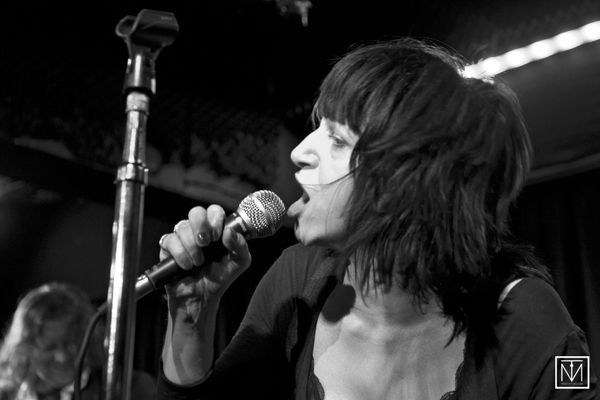
I have a piece about this called Murdered Sons. To me little boys don’t start out wanting to be monsters or madmen. They’re either carrying on the family tradition of abuse or they’ve been neglected. A lot of the schoolyard snipings are the result of bullying. There was a great article by a guy who custom-made rifles. He made a list of the last 20 years of school yard snipings and every drug the kids were on.
At first it was Prozac, Zoloft, Xanax and it runs in those sorts of clumps, and then he was murdered two days after the article came out. We’re talking about drugs that don’t work for an existential condition, [for issues] that would probably be better treated with understanding. And that leads to why I do what I do. I’m not preventing killers but I’m not breeding them either.
I know that (and you can take this as you want it) having a voice and a vehicle prevents me from doing unimaginable amounts of violence.
It is also based on empathy. I can handle my situation quite fine alone. I do feel that it is a calling, to be a mouthpiece for some individuals that just feel they’re screaming and no sound is coming out.
That’s a real strong minority, that doesn’t have to grow. I’m quite happy with the size of my audience. It hasn’t changed. It won’t, as a matter of fact. Any bigger does not make me happy because it’s very intimate what I do. Even if it’s fucking cock-rocking around – as I’m wont to do occasionally. [laughs]
It’s always shocking to me that they show up.
To me it’s all about the words, the bottom of it, and the beginning of it. Music is just another tool to bang people over the head with, or to seduce or whatever, depending on the song itself. I feel a duty and a calling and an ancient connection to the art of spoken word, the art of word, to the town crier, to the prophet of doom, to the No Wave Nostradamus that I am. And I say that with a bit of sarcasm but I mean that completely.”
Part two of this interview (Allies, Enemies and Joe Rogan) appears next week.
Photos by Carl Byron Batson. Not to be reproduced without prior permission.

Editor, founder, fan.

